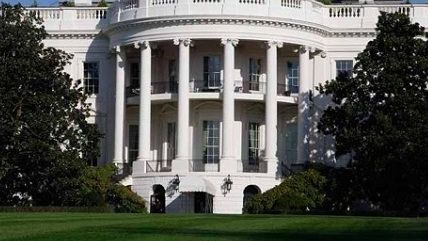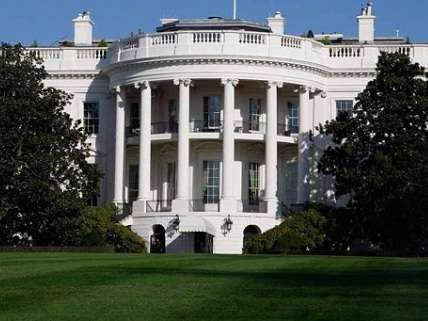President Obama Updates National Security Strategy For First Time in Five Years
America's national security strategy is to take responsibility for world security, peace, and prosperity.


For the first time since 2010, the White House has updated (PDF) its National Security Strategy, a report required annually by law. The document is full of generic rhetoric like leading with purpose, leading with strength, and leading with "a long-term perspective," placing on the U.S. the responsibility for maintaining peace, security, and prosperity around the world, with no recognition of how that posture has made peace, security, and prosperity around the world more difficult to achieve.
The strategy laid out, the document claims, "builds on the progress of the last 6 years, in which our active leadership has helped the world recover from a global economic crisis and respond to an array of emerging challenges." Those challenges successfully responded to include "strengthening an unrivaled alliance system" in Europe, bringing "most of our troops home after more than a decade of honorable served in two wars while adapting our counterterrorism strategy for an evolving terrorist threat," responding to natural disasters in places like Haiti, Japan, and the Philippines, and "building an unprecedented international sanctions regime to hold Iran responsible for failing to meet its international obligations" while continuing negotiations, and "taking concerted action to confront the dangers posed by climate change."
The document outlines eight security points in part covered in the challenges the White House says the U.S. is successfully confronting already:
(1) Strengthening national defense by continuing to "insist on reforms and necessary investment" in the military
(2) Reinforcing homeland security by "bringing together all elements of our society—individuals, local communities, the private and non-profit sectors, faith-based organizations, and all levels of government—to make sure America is resilient in the face of adversity."
(3) Combatting the "diminished" but still persistent threat of terrorism by "pursuing a more sustainable approach that prioritizes targeted counterterrorism operations, collective action with responsible partners, and increased efforts to prevent the growth of violent extremism and radicalization that drives increased threats"
(4) Strengthening "U.S. and international capacity to prevent conflict among and within states." The document mentions "Russia's violation of Ukraine's sovereignty and territorial integrity" and "North Korean provocation in East Asia, pointing to continued effort "to bolster the capacity of the U.N. and regional organizations to help resolve disputes, build resilience to crises and shocks, strengthen governance, end extreme poverty, and increase prosperity."
(5) Preventing the spread of WMDs
(6) Confronting climate change, by negotiating more
(7) Assuring access to "shared spaces—cyber, space, air, and oceans—that enable the free flow of people, goods, services, and ideas."
(8) "Cybersecurity," where the U.S. has a "special responsibility" as the birthplace of the Internet.
U.S. national security interests remained defined the same way in the 2015 update to the national security strategy, broad enough to cover any interventionist want:
• The security of the United States, its citizens, and U.S. allies and partners
• A strong, innovative, and growing U.S. economy in an open international economic system that promotes opportunity and prosperity
• Respect for universal values at home and around the world; and
• A rules-based international order advanced by U.S. leadership that promotes peace, security, and opportunity through stronger cooperation to meet global challenges.
"This National Security Strategy provides a vision for strengthening and sustaining American leadership in this still young century," the document concludes. "It clarifies the purpose and promise of American power. It aims to advance our interests and values with initiative and from a position of strength. We will deter and defeat any adversary that threatens our national security and that of our allies."
Read the 29-page document here and then check out Reason's foreign policy special here.


Show Comments (48)